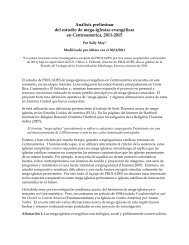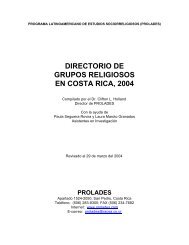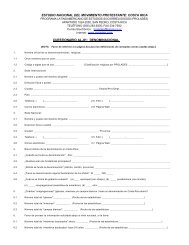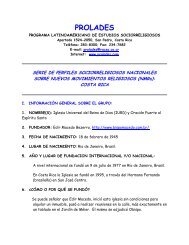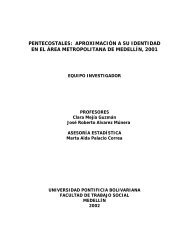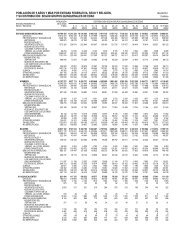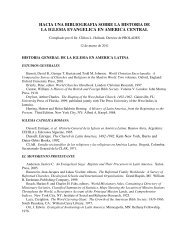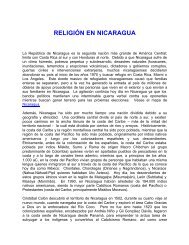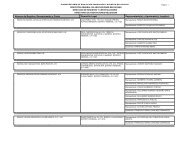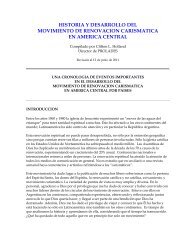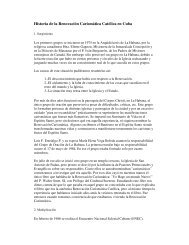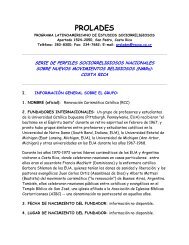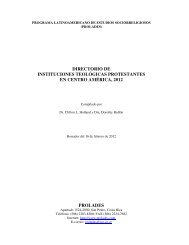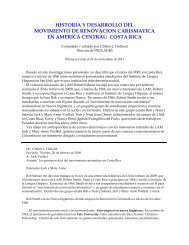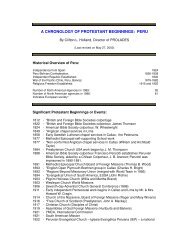Toward a Classification System of Religious Groups ... - Prolades.com
Toward a Classification System of Religious Groups ... - Prolades.com
Toward a Classification System of Religious Groups ... - Prolades.com
You also want an ePaper? Increase the reach of your titles
YUMPU automatically turns print PDFs into web optimized ePapers that Google loves.
aptism by immersion" [borrowed from the Mennonites], thereby<br />
negating the established practice <strong>of</strong> infant baptism by “sprinkling;" in<br />
this way the two principal Baptist subfamilies were established; the third<br />
subfamily represents the Seventh-day Baptists, founded in London in<br />
1617 by John Trask, as keepers <strong>of</strong> the Sabbath [Saturday], rather than<br />
Sunday.<br />
Some <strong>of</strong> the first Baptist creedal statements were the following: (1)<br />
the "Twenty-nine Articles <strong>of</strong> Faith" written in Latin by Smyth in<br />
Amsterdam prior to his death in November <strong>of</strong> 1612; (2) the "Nineteen<br />
Articles <strong>of</strong> Faith" written by Helwys around 1611-1612; (3) the “East<br />
London Confession” <strong>of</strong> 1644 among Particular Baptists; (4) the first<br />
“General Baptist Confession <strong>of</strong> Faith” <strong>of</strong> 1651 in Lincolnshire; and a<br />
variety <strong>of</strong> other confessions <strong>of</strong> faith produced by English Baptists<br />
between 1650 and 1700. In the USA, the “New Hampshire Confession <strong>of</strong><br />
Faith,” produced by the Baptist Convention <strong>of</strong> New Hampshire in 1833,<br />
is a more <strong>com</strong>plete confession <strong>of</strong> faith and reflects a “moderate Calvinist<br />
position,” which was widely accepted among Particular Baptists in North<br />
America at the time.<br />
The first Baptist churches in North America were established in the<br />
Colony <strong>of</strong> Rhode Island by Roger Williams at Providence in 1639, and by<br />
Dr. John Clarke at Newport in the period 1638-1648. Williams, the<br />
governor <strong>of</strong> the Colony, has been called “the father <strong>of</strong> religious liberty in<br />
America.”<br />
B2.21 Arminian or General Baptists<br />
Overview: English and Dutch roots: John Smyth, 1608-1612; Thomas<br />
Helwys and John Murton in London, England, 1612; Rhode Island<br />
Colony, Roger Williams in 1639 and John Clarke in 1648; called “General<br />
Baptists” because <strong>of</strong> their belief in the general atonement <strong>of</strong> Jesus Christ<br />
for all humanity; theologically, they are Arminians.<br />
B2.2101 National Association <strong>of</strong> Free Will Baptists (1727, Paul Palmer, North<br />
Carolina; reorganized in 1935 when they adopted their current name;<br />
headquarters are in Antioch, TN; mission work is conducted in Spain,<br />
Panama, Cuba, Brazil, Uruguay, Mexico, Puerto Rico and the Virgin<br />
Islands)<br />
B2.21011 General Conference <strong>of</strong> Free Will Baptists (founded by Benjamin<br />
Randall in New Durham, New Hampshire, in 1792 as an Annual Meeting<br />
and in 1827 as a Conference)<br />
B2.21012 United Free-Will Baptist Church (1901, Kingston, NC; predominantly<br />
among Afro-Americans; in 1952, there were 836 churches with about<br />
100,000 members)<br />
B2.21013 Original Free Will Baptists, North Carolina State Convention (1913,<br />
Ayden, NC; has mission work in Mexico)<br />
45



